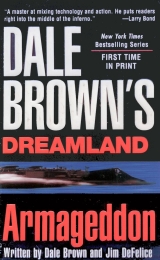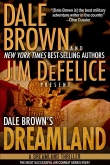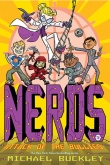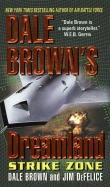
Текст книги "Armageddon"
Автор книги: Dale Brown
Жанр:
Боевики
сообщить о нарушении
Текущая страница: 4 (всего у книги 20 страниц)
Sahurah nodded, and followed along inside.
* * *
FLUSH WITH HIS VICTORY AT SEA, DAZHOU MET THE MUSLIM fanatic in his office.
“Have a drink,” he said to him, putting down a bottle on his desk. He laughed at the expression of horror on the man’s face. “It’s juice,” he told him, “but you needn’t drink it anyway.”
He looked at him more closely. “You’re the messenger?”
The fanatic nodded. There was no possibility of mistake—no rebel would show up here on his own. Unlike many of the rebels in the movement, Sahurah appeared to be a native of Borneo, very possibly of Malaysian extraction, though with thirty-one different ethnic groups on the large island there were many who could claim to be native here. Dazhou’s own family had been on Borneo for centuries.
“You know who I am?” Dazhou asked.
The young man—he was surely in his late twenties, though his face showed the pain of someone much older—shook his head.
‘That is just as well,” said Dazhou. “There is a bathroom there, if you need it. We will leave in five minutes. Once we start, we will not stop.”
Dreamland
7 October 1997, (local) 1630
After the botched demonstration of the robot warrior system, Danny’s day became an unrelieved series of frowns and down-turned glances. He avoided breakfast with the congressmen, claiming that he had to work with the technical team recovering the devices, and managed to skip lunch by tending to his normal duties as security chief on the base. But couldn’t avoid the afternoon debriefing sessions, which culminated in a show-and-tell session for the VIPs in one of the Dreamland auditoriums. Danny walked down the hallway to the room feeling like the proverbial Dead Man Walking.
The ARC robots had actually worked exactly according to spec. Unfortunately, they had been foxed by Boston, who exploited a weakness in the system to torpedo the mission. The inexpensive, off-the-shelf sensors in the units could not see very well through smoke. While the grenade that Boston’s team member had launched at the unit might not have blinded it for very long, once it started firing off its canisters the entire area was for all intents and purposes shrouded in an impenetrable fog. Boston had timed his intrusion just right, racing as fast as he could eight hundred and fifty meters to the downed airman, who by the exercise rules was unarmed and couldn’t hear him anyway because of the approaching Osprey. Armed with only his pistol—a rifle would have slowed him down—Boston incapacitated the airman, then waited for the rescuers.
It wouldn’t have worked in real life—the grenades would have been shrapnel rather than smoke, and presumably incapacitated or killed the intruders. But that distinction seemed lost on the congressmen who were watching the video feeds in the Dreamland conference center. And the army people present for the demonstration weren’t very happy about it either. The Army had supplied 90 percent of the development funding so far, and its contribution was up for review.
Danny stood gamely with the project officers and the science types as they opened the floor up to questioning. One of the congressmen started things off by asking where the man who had shown the way around the robots was.
“Sergeant Rockland is probably enjoying a well-earned rest right now,” said Danny, trying to force a smile. “One of my best men. We try to train them to think outside of the box”
“Or the robot,” said the congressman.
Danny did his best to laugh along with them, ignoring the dagger eyes from the army people.
Boston was waiting for him in his office when he finally made it over there two hours later.
“You were looking for me, Cap?” asked the sergeant. Something about his sophomoric smile burned right through Danny.
“You blew the parameters of the test,” Danny told him. “You screwed the whole stinking thing up.”
“What do you mean?”
“Those were supposed to be shrapnel grenades. Your team would have been dead.”
“No, we were far enough away. I made sure of that”
“You ran right through the smoke,” said Danny. “That wouldn’t have happened in real life. You would never have made it in time.”
Boston shrugged.
“I don’t like your attitude. Sergeant,” said Freah.
“Captain—don’t you preach that we ought to use our heads?”
“Go on. Dismissed. Go”
“But—”
“Out!”
Danny pretended not to see him shake his head.
Brunei
8 October 1997, (local) 0900
As Mack pulled himself out of the A-37B’s cockpit, the fatigue that had been trailing him the whole flight jumped out and wrapped itself around his neck. The sun beat down on the concrete apron, and the humidity hung around him like the thick steam of a shower room. Mack had originally planned to go home and take a nap after debriefing the training session, but the morning’s developments meant there would be no rest for the weary; quite the contrary. The sultan would undoubtedly be wondering what was going on and expect a personal briefing, as would Prince bin Awg. The central defense ministry—a collection of service heads and other military advisors, including Mack—would also be looking for information.
The EB-52 banked overhead, preparing to land. Mack turned back toward the runway, watching the big plane swing in. It wobbled slightly—obviously one of his people was at the stick. Still, the landing was solid. All in all, they were making progress.
Slow progress, but progress.
“ ‘Scuse me,” said a woman’s voice behind him. “You Mack Smith?”
Mack turned, surprised to hear what sounded like an American accent.
“You’re the minister of defense?” said the woman.
“Deputy minister of defense—air force,” said Mack, giving his official title. “Such as it is.”
He might not have added the last comment if the woman had been anything other than, well, plain, though plain didn’t quite cover it. She was somewhere over twenty-one and under forty, five-four, on the thin side. Her short hair had a slight curl to it, and that was the nicest thing you could say about her looks. She wore a pair of jeans and a touristy blue shirt.
“I’m McKenna,” she said, thrusting out her hand.
“McKenna is who?” said Mack.
“Pilot. You were looking for contract pilots? Does it help that I can speak Malaysian?”
She reeled off a few sentences in the native language, which was shared by Brunei and its island neighbors. Mack hadn’t been here long enough to understand more than a few words; he thought he recognized the phrase for “have a nice day,” but that was about it.
“I think you have the wrong idea,” said Mack. “I’m putting together a combat air force. The civilian airline is still on its own”
“Well no shit,” said the woman. “I’ve flown F/A-18s for the Royal Canadian Air Force, and for the last year I’ve been a contract pilot for a horse’s ass of an outfit trying to sell third-hand Russian-made crates of crap that I wouldn’t put my worst enemy in. That light your f-ing fire?” said McKenna.
Well, she could talk like a pilot at least, thought Mack.
“I don’t have any F/A-18s,” he told her.
“I can fly anything,” she said. “Ask Prince bin Awg. He let me fly his MiG-19 and his Sabre last year. We went at it a bit and I waxed his butt good. I’d love to get behind the wheel of one of those,” she added, thumbing toward the Megafortress, which was just heading toward its parking spot in front of the hangar on the left.
“It doesn’t have a wheel. It’s got a stick, like a real airplane,” said Mack. “They put it in when they upgraded it.”
“Well kick ass then,” said McKenna.
Mack started toward the hangar to change, and McKenna fell in alongside him.
“So? Am I hired?” she asked.
“Hired for what?”
“For a pilot.”
“What Russian planes did you fly?”
“Anything and everything.”
“MiG-29s?” asked Mack.
“Do it in my sleep.”
“How about Su-27s?”
“One or two”
“You fly them around here?”
“Nah”
“Out of Labuan?”
“Are you kidding? The Malaysians don’t operate jets out of there”
“Ever?”
“About six months ago we tried to sell a pair of MiG-29s,” said McKenna. “We brought them to Kuching at the far south of Borneo from the peninsula to demonstrate some of the changes that extended their range. But no one was buying.”
“What about the Indonesians? You fly Sukhois out here for them?”
“For the Indonesians?” McKenna laughed. “Malaysia, Indonesia—their governments aren’t on Borneo,” said McKenna.
“You have to sell where the money is.”
“You haven’t flown Su-27s on Borneo at all?”
She shook her head.
“You hear of either country having them?”
“You’d know better than me, Minister.”
Mack stopped. “Yeah, cut the shit. They have them?”
McKenna examined his face for a moment before answering. “Indonesia doesn’t have anything newer than Northrop F-5s. The Malaysian Royal Air Force has MiG-29s and F/A-18s over in West Malaysia, near the capital of Kuala Lumpur. Most of what my boss sold was used and it’s hard to buy used when you’ve been buying new. Her dealings with the Malaysians were mostly for ammunition and some avionics spare parts.”
“I was jumped by two Su-27s this morning,” said Mack.
“Get out of town.”
Mack smiled sardonically. “They came up out of the south-west, from Malaysian territory, turned on their targeting gear to scare me, and took off.”
“They scared you?”
“Yeah, right.”
“What’d you do?”
“Gave them the finger and took their pictures,” he said. “I want to figure out who they are”
“I’ll look at it for you if you want”
Mack shrugged. It couldn’t hurt, though most likely it wouldn’t help, either.
“They could have come out of Kuching,” admitted McKenna. “But it’s a good hike to get up here, over five hundred miles. And your spies would have told you they were there, wouldn’t they have?”
“Who says I have spies there?”
“You have spies everywhere,” said McKenna. “Dragonfly, huh? You would’ve been dead meat.”
“What, from a couple of Sukhois? Give me a break,” said Mack.
“Depends on the pilot,” said McKenna, her voice only a bit conciliatory. “If it were me, I’d’ve waxed your fanny.”
“If you were in the Sukhoi?”
“Either way”
“If you fly half as good as you talk, McKenna,” said Mack, resuming his stride toward the hangar, “you got yourself a job.”
Brunei
1600
The time difference between the States and Brunei made it difficult for Breanna to get any information without invoking official channels, which she didn’t want to do. Finally she thought of Mark Stoner, a CIA agent who’d worked with Dreamland on some recent missions and who was back east in D.C. By the time she tried him, however, it was midnight there, and when she got his machine she left a message, asking him to call “when he got a chance.” Then she forgot about him until, to her great surprise, the hotel desk buzzed her room at 3 P.M. to tell her he was on the line.
“Mark—what are you doing up at 2 A.M.?” she asked.
“It’s 3 A.M. here,” said Stoner. “There’s a twelve-hour difference. No daylight savings. We’re a half-day behind you. You said you had a question.”
“Couple of questions. Unofficially.”
Breanna told him about the aircraft, which according to the images captured by the Dragonfly had no identifying marks.
“They came out of Malaysian territory?” Stoner asked when she had finished her summary.
“Looked like.” She didn’t want to be too specific, worrying that anyone listening in would be able to gather information about the targeting system’s abilities—and she had to assume that might include Malaysian spies.
“There are two Malaysian air bases, auxiliaries to civilian airports. Neither field is really set up to support military jets, at least not that I know.”
“Can you check?”
“Have you talked to the Department of Defense?”
“I filed a report, but no one seemed particularly interested. A pair of Sukhois doesn’t really rock their world.”
Stoner was silent for a moment, then he asked, “If I gave you an address, could you get to it this afternoon?”
“I think so “
“It’s in Kampung Ayer. Do you know what that is?”
“The island city in the bay off the capital?”
“Write this down.”
BREANNA FOUND MACK STANDING ON THE BACK OF A PICKUP truck at the edge of a cliff overlooking the ocean several miles southwest of the airport. A British-built truck sat nearby, with two Brunei air force sergeants working an old field radio in the back. Below the cliff was a narrow plateau of rocks just out of the water’s reach. Several pieces of plywood were set up as targets for an A-37B.
Breanna watched as the airplane came around from the north and made a run parallel to the coastline. The rocks bubbled and one of the plywood panels split in two. The airplane then rose abruptly, its right wingtip no more than ten feet from the cliff edge.
“I have to say, pretty good,” said Mack. “Tell her to nail the last target any way she wants,” he shouted to the men in the truck.
Not five seconds later, the Dragonfly rolled back toward land, heading dead-on for the beach—upside down. The last piece of plywood folded in half.
Not that anybody on land had seen. They’d all ducked for cover as she blew past, maybe six feet off the ground.
“New pilot?” Breanna asked.
“Yeah. I’m pretty desperate,” said Mack.
“He looks pretty good,” said Breanna. “Even if he is a showoff.”
“It’s a she,” said Mack. “And actually, her looks are, uh, not exactly on the measurable chart. But she’s a helluva pilot. Why are you here?”
“I’m doing you a favor,” said Breanna. “We need to go out to a place in Kampung Ayer.”
“We? Listen Bree, I’m due back in the capital in an hour to explain to my fellow ministers of defense how aircraft that don’t exist may very well have sunk that merchant ship. I don’t have time for a boat ride.”
“I called Mark Stoner and told him about your Sukhois. He told me to go out to see someone there.”
“Stoner’s the CIA spook who’s an expert on South Asian weapons?”
“One and the same.”
The A-37 buzzed back. Mack didn’t duck this time.
“I hate show-offs,” he said, jumping out of the truck. “Especially when they’re worth watching.”
KAMPUNG AYER WAS A WATER VILLAGE IN THE BAY OUTSIDE the capital. Buildings rose on stilts from the murky water, whose pungent odor matched its mud-red tint. Until today, Breanna had seen the lagoon city only from a distance. She stared at the people as she and Mack passed in their water taxi, amazed at how ingenious humans could be.
“There,” said the man driving the water taxi. They pulled up against a planked walkway that led to what looked like a floating trailer. Its rusting metal roof was weighted down by satellite dishes.
“You wait, right?” said Mack, pointing at him.
“I wait,” said the man.
Mack jumped up and started walking toward the house. Breanna scrambled to follow. She barely kept her balance on the bobbing boards, and had to grab Mack’s arm just as she caught up to him.
“Hey,” he said. “Watch it or we’ll fall into that sewer water.”
“Thanks, Mack.”
Mack pulled open the screen door and they walked lino what could have passed for a doctor’s waiting room. A young Malaysian sat behind the desk, paging through a magazine.
“Mark Stoner sent us,” said Breanna.
“Cheese is expecting you,” said the man, gesturing toward an open doorway to his left. “Go in”
“Cheese?” said Mack.
The only light in the room came from a large-screen TV, which was tuned to CNBC. Hunched on the floor in front of a leather couch was a man pounding a keyboard. A bottle of Beefeater gin sat next to him.
“Hello,” said Breanna.
The man put his hand out to shush them, then continued typing.
“You’re Cheese?” asked Mack.
The man picked up the Beefeater, took a swig, then held it out to them without looking away from his laptop.
“No thanks:’ said Breanna.
“I’ll pass:’ said Mack.
The man took another swig, still typing with one hand. In his thirties or early forties, he was obviously American, wearing a light blue T-shirt and a pair of cut-off jeans.
“Stoner’s people, right?” he asked, still tapping his keys. “Yes,” said Breanna.
“I want to know about some airplanes,” said Mack.
“I don’t want to know anything. Nothing. Zero.”
“Mark told me to come here,” said Breanna.
“Yeah, but I don’t know anything about it, okay? I have a Web link for you to look at in the other room,” he said. “I typed it in already. All you have to do is hit enter.”
The man typed one more thing on his laptop, then put it down and got up.
“James Milach. They call me Cheese because I made a killing in the stock market involving Kraft. No shit,” said the American. He shook Mack’s hand—then bent over and kissed Breanna’s. “Beefeater makes me formal,” he said, sweeping away into the next room.
* * *
MACK THOUGHT FOR SURE HE’D STEPPED INTO AN INSANE asylum. Stoner was a spook, and spooks knew weird people, but this character was—a character.
But then this had been a particularly perplexing day all around. The sultan had expressed some concern about the Sukhois, but discounted Mack’s theory that they had been responsible for the attack on the merchant ship. The spy network, meanwhile, reported that there had been no activity at any of the airports on Borneo or even nearby Indonesia or Malaysia.
The Brunei navy’s pet theory was that the ship had been sabotaged by Islamic terrorists, who had placed a bomb aboard. While Mack wouldn’t rule that out, it was a convenient theory in that it kept the navy from having any responsibility. The investigation was continuing; thus far, no survivors had been found.
“You hit the button, and then you can take it from there,” said Cheese, standing over a Sun Workstation. “You got it?”
“Sure,” said Breanna. “This is the Web?”
Cheese smiled at her. “Not exactly. But you don’t want to know too much, do you?”
Mack rolled his eyes, then hit the key and bent toward the screen. Brown and black shades slowly filled the screen. It took a few moments for Mack to realize he was looking at a satellite photo of the northern part of the island, which was Malaysian territory.
“Some sort of Russian satellite,” said Breanna, pointing at the characters on the side of the screen. “You think he’s tapped into their network?”
“I don’t know,” he told her, leaning down to squint at the screen. “But that looks like the outline of a Sukhoi on what looks like a highway in the middle of nowhere. I’m going to have to look at a map but I think that’s Darvel Bay, on the eastern side of Sabah province. That whole area is just jungle. Or at least it used to be.”
Dreamland
8 October 1997, (local) 1800
Dog hustled from the Dolphin shuttle helicopter that had dropped him off at Dreamland toward the black SUV waiting to ferry him over to his quarters. He was surprised to find Danny Freah behind the wheel.
“Personnel shortage?” Dog asked as he got into the passenger seat beside him.
“Wanted to have a chat.”
“Fire away,” said Dog, bracing himself.
“We had a problem with the demonstration this morning,” started Danny.
Dog listened as the captain detailed what had happened. “l’m sorry, Colonel,” said Danny as they arrived in front of the small bungalow that served as Dog’s quarters here. “I’m truly sorry”
“Well, the outcome wasn’t what we’d hoped, I agree,” said Dog. He wanted to sound philosophical without sounding as if he were making light of the situation—a tough balance. “But actually it doesn’t sound that bad. If the technical people explained about the smoke grenades, I’m sure it’ll be kept in perspective”
“We screwed up in front of a bunch of people who would like to chop off our heads,” said Danny.
“Congress doesn’t want to chop off our heads. Just our budget,” said Dog.
“Yeah.”
“It’s all right, Captain.” Dog opened the door. “I’m going to just put this stuff inside and then head back over to my office. Can you stay a minute and give me a lift?”
“Yes, sir.”
Danny’s mood was even more somber than before. Dog pulled his bag out of the truck, searching his mind for a better pep talk as he walked up the path to his quarters.
WHEN JENNIFER SAW DOG FINALLY COMING UP THE WALK, she leaned against the wall, knowing she’d be just out of sight when he came in. She listened to him fumbling with the key; as the door creaked open she heard her heart thumping loudly. She hesitated a second, suddenly feeling foolish for sneaking into his apartment to surprise him.
Dog, oblivious, closed the door behind him and took a few steps into the dimly lit cottage.
“Hey,” she said, staying back by the wall rather than going to him as she’d planned.
“Jen!”
He sound surprised, not shocked but taken off-guard, as if she were the last person in the world he’d expect here, the last person he wanted to find here.
“What are you doing?” Dog flipped on the light.
“I was surprising you,” she said.
“Great,” he said, but it sounded unconvincing to her.
“Do you want some wine?” she tried, struggling against her growing anxiety.
“I would but I have to get over to my office and then look after the congressional delegation. Maybe later, okay?”
“Oh”
“You all right?” He put his arms around her but somehow it felt forced and unnatural.
“I’m okay,” she said.
“I do have to go. I’m sorry,” he said.
Kiss me, she thought. Kiss me. But even when he did, she thought he was distracted, and she felt worse than before.
“Later?” he said, letting go of her.
She forced herself to nod. But then she added, “I may have to work.”
“Oh. Well. Try to come over.”
“I will.”
Then he turned and, without bothering to change, went back out the door.
Sandakan, Malaysia (northern Borneo)
9 October 1997, 1053
The long ride across the island left Dazhou stiff and impatient, though he knew better than to show emotion, let alone physical discomfort, as he waited outside the general’s office. General Udara was inside, speaking on the telephone just loudly enough to make it clear to Dazhou that he was there; this was no doubt his intention, as the commander never lost an opportunity to demonstrate his superiority to his underlings. Finally, after he had waited for nearly twenty minutes, Dazhou was shown into the office. Udara pretended to be reading some report, making a show of frowning before looking up and pointing to the paper.
“You exceeded your authority,” said Udara.
“The Barracuda had to be tested. The target presented itself. The opportunity was taken. It coincides with our greater plans and schedule.”
“You think it is all that simple,” snapped Udara. “You think you can use the cover of events to indulge your psychological needs. We had to divert two aircraft to take the attention away from you.”
“Why?” asked Dazhou.
“The radio reports back to the Brunei air force center showed they were pursuing a craft. We could not afford discovery.”
“Which aircraft?” asked Dazhou.
“Part of our project,” said the general dismissively. “You do not need to know every detail.”
Dazhou held his tongue. He could easily guess that the general was referring to the Sukhois that had been brought three months ago to the base in the northern mountains; Dazhou had informers in the military who had told him how the planes had been purchased from the Ukrainians and then shipped in pieces and reassembled. They were necessary for the “project,” as Udara dismissively termed it, but using them to cover the Barracuda’s escape had been unnecessary. Still, he knew better than to argue with the general, who commanded all Malaysian military forces on Borneo. While Dazhou had first suggested the alliance with the terrorists to achieve their common aim, it was General Udara who had made it possible, and he wielded such power that Dazhou could not cross him.
Yet.
“I expect from the reports that the vessel worked,” said Udara.
“Precisely as predicted.”
“You are ready to proceed?”
“Upon your order.”
It was the note Udara had been waiting for. His manner changed; he smiled and leaned back in his seat.
“You are tired after your journey?” said the general.
“No.”
“Something to eat?”
“No thank you, sir.”
“How long will the sultan fend off the terrorists?”
“Without our help, the terrorists will struggle for weeks,” said Dazhou. “If we help them, the sultan and his puppet government may last twelve hours.”
Another smile. Udara rose. He took a few steps away from his desk, filling the room with pompous swagger. “The messenger is here?”
“He is.”
“Who is he?”
“I do not know.”
“The secretary said he was a child.”
“He is young, but not that young. I would say in his twenties. With these fanatics, it is difficult to say sometimes.”
“Does he have information about the connection to Afghanistan?”
“I thought it best not to interrogate him without your authority,” said Dazhou, who in truth was not in the least interested in the Islamic crazies and their network of madmen. He wanted only to eliminate the bastard sultan of Brunei, whose family had seized his ancestors’ property two generations ago, casting them into poverty. At long last, the wrong would be avenged.
“If we give the terrorists Brunei, how long do you think they will be satisfied?” the general asked.
“I do not think it would be long,” said Dazhou. “And it is irrelevant.”
“Yes,” agreed the general. “Quite irrelevant.”
Whether the terrorists would be satisfied with controlling Brunei or not, the Malaysian government would not allow the terrorists to control their neighbor for very long. On the contrary—one of the attractions of the plan was that it would allow them not only to crush the terrorists and seize oil-rich Brunei, but to receive ASEAN backing to do so. Once the sultan was kicked out and the terrorists in control, the Malaysian military would turn on its allies of convenience. Dazhou had already drawn up plans to do so.
But those operations were in the future. For now, they had to concentrate on Brunei.
Udara went back to his desk and picked up the phone. “Have our visitor fetched from the room and brought to me,” he told his assistant.
* * *
SAHURAH SAT ON THE FLOOR OF THE EMPTY ROOM, TRYING TO keep his mind ready. Again and again it drifted. He saw the girl he had had in Beaufort, the other in Sandakan. Beautiful, beautiful girls—temptations from the time before his commitment, sins, and yet he couldn’t banish them.
He owed the true God his complete attention, especially now, especially here on this mission. He should see himself as God’s trusted messenger—for as the imam’s emissary what else was he? And yet the impure thoughts haunted him, hungry ghosts clawing to be fed. The flesh was a terrible chain, an awesome torment. He would be better to be rid of it, gone to paradise.
He was a coward, a coward and a failure. That was the lesson of the miscarried plans on the beach. He should have shot the infidel devils the moment he saw them, rather than hesitating.
Sahurah was not exactly sure where on Borneo he had been taken. The men who rode with him in the jeep had blindfolded him three separate times, including the last hour. He guessed he was on the northern part of the island, in the Malaysian region known as Sabah, but in truth he could have been in the south or in Indonesian territory as well. He thought he had detected the scent of seawater on the breeze as he was led from the Jeep, but it had been fleeting.
A soldier opened the door and nodded at him. Sahurah got up and followed him down the hallway. They went up two flights of carpeted stairs, past walls made of polished stone with elaborate inlays. The walls had once been lined with sculpture, but the niches were now bare.
The soldier stopped and turned in front of a wide doorway lined with an elaborate molding. Inside, Sahurah found a young man at the desk. He gave Sahurah a disapproving frown, then picked up his phone.
“Go,” the man at the desk told him in Malaysian. “And be quick about it.”
Sahurah gathered his dignity and walked into the room at his most deliberate pace. He was a messenger and a representative, not to be treated without respect.
Dazhou was inside, sitting in a simple wooden chair. Behind the desk was a short, skinny man in a military uniform. He was nearly bald, his face the red color of ruby glistening in the sun. Sahurah believed that the man was either the army general who commanded Malaysian forces on Borneo, or one of his immediate underlings. He had seen the pictures some time ago and couldn’t remember precisely which one he was. He stared at the man now, trying to memorize his features so he could describe them later.
“You have been sent?” said the officer.
“I have been sent”
“And?”
“I was told to come,” said Sahurah.
“That’s all?”
“Perhaps you should begin by paying your respects to the general,” said Dazhou from the side.
Sahurah bowed his head. “I am not here on my own, or I would offer profound apologies.” The words came slowly at first, but as he found the formula they began to flow. “I am not worthy of the people who have sent me. They, however, are your equals, and should be treated with the respect due. As I am their representative, then I must also be accorded respect.”
“Please, little puppy, don’t lecture me,” said the general.
He glared at Sahurah. The general’s hostility stiffened Sahurah’s resolve—he was here not on his own but as the representative of his imam, of men who had the word of the Prophet deep in their soul and could pass it to others. He would not disgrace them.
“I am not here on my own,” repeated Sahurah.
DAZHOU FOUND THE MUSLIM MADMAN’S IMPERTINENCE rather amusing, though of course he did not laugh in front of Udara. The terrorist was showing commendable backbone. Of course, there was always the danger that would provoke Udara into having him bound and taken to the basement; whatever amusements that provided, it would set back their plans several years, if not derail them completely. And so he decided finally to interrupt and move things to their conclusions.
“No one is insulting your masters,” said Dazhou. “The fact that you were brought into the general’s presence rather than being shot on the street—as any rebel is apt to be—proves that the general holds them in very high esteem.”
Dazhou glanced over at Udara. The general’s cheeks were a shade of bright red, and beads of perspiration were now arranged in a row on his forehead. Dazhou decided to proceed quickly.
“Were you told to say anything?” he asked the messenger.
“Nothing”
“Then your master understands the gravity of the situation, and the generous concessions that the general has made to him.”








